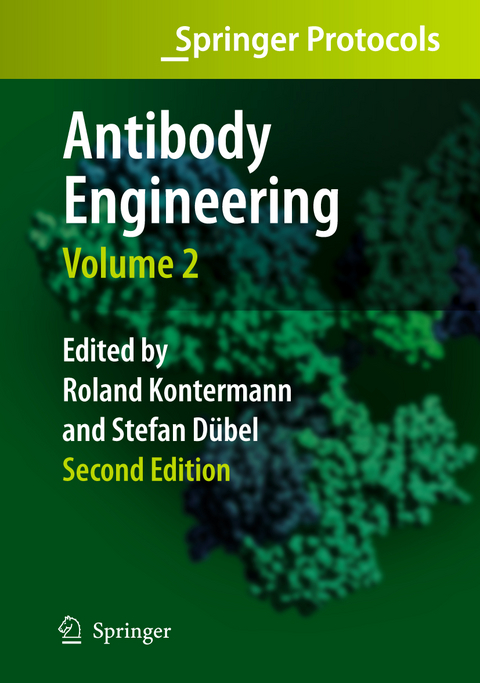
Antibody Engineering Volume 2
Springer Berlin (Verlag)
978-3-642-42276-8 (ISBN)
Antibodies are indispensable tools for research, diagnosis, and therapy. Recombinant approaches allow the modification and improvement of nearly all antibody properties, such as affinity, valency, specificity, stability, serum half-life, effector functions, and immunogenicity."Antibody Engineering" provides a comprehensive toolbox covering the well-established basics but also many exciting new techniques. The protocols reflect the latest "hands on" knowledge of key laboratories in this still fast-moving field. Newcomers will benefit from the proven step-by-step protocols, which include helpful practical advice; experienced antibody engineers will appreciate the new ideas and approaches. The book is an invaluable resource for all those engaged in antibody research and development.
Stefan Dübel received his PhD at the Center for Molecular Biology Heidelberg and spent his post-doc at the German Cancer Research Center with research on the development of antibody display libraries. In the following years, he substantially participated in the invention of recombinant antibody phage display technology, as well as other recombinant antibody technologies and the development of various antibody fusion proteins. In 1996, he moved to the University of Heidelberg to establish the antibody engineering group at the Institute of Molecular Genetics. After holding a group leader position at the University of Heidelberg from 1996, Stefan Dübel went to the Biological Faculty of the Technical University of Braunschweig as a full professor in 2002. Here, he currently serves as head of the Department of Biotechnology in Braunschweig and managing director of the Institute of Biochemistry and Biotechnology. He has co-authored more than 90 scientific papers, 17 patents, as well as two acknowledged textbooks in the field of recombinant antibodies. He is also board member of scientific journals and the biotech industry.
Bioinformatics of Antigen-binding Sites.- Analysis of Single Chain Antibody Sequences Using the VBASE2 Fab Analysis Tool.- Standardized Sequence and Structure Analysis of Antibody Using IMGT®.- Protein Sequence and Structure Analysis of Antibody Variable Domains.- Generation of Antibody Fragments and Their Derivatives.- scFv by Two-Step Cloning.- Bivalent Diabodies.- Generation of Single-Chain Fv Fragments and Multivalent Derivatives scFv-Fc and scFv-CH3 (Minibodies).- Miniantibodies.- Generation of Stably Transfected Eukaryotic Cell Lines Producing ImmunoRNAse Fusion Proteins.- Antibody-Cytokine Fusion Proteins with Members of the TNF-Family.- Recombinant Immunotoxins for Treating Cancer.- T Bodies.- Expressing Intrabodies in Mammalian Cells.- Phenotypic Knockdown with Intrabodies.- Disulfide-Stabilized Fv Fragments.- PEGylation of Antibody Fragments to Improve Pharmacodynamics and Pharmacokinetics.- Fusion Proteins with Improved PK.- In Vivo Biotinylated scFv Fragments.- Bispecific Diabodies and Single-Chain Diabodies.- Generation and Characterization of a Dual Variable Domain Immunoglobulin (DVD-Ig(TM)) Molecule.- Isolation of Antigen-Specific Nanobodies.- CDR-FR Peptides.- Production of Antibody Fragments.- Purification and Characterization of His-Tagged Antibody Fragments.- Production of Antibody Fragments in the Gram-Positive Bacterium Bacillus megaterium.- Analysis and Purification of Antibody Fragments Using Protein A, Protein G, and Protein L.- Purification and Analysis of Strep-tagged Antibody-Fragments.- Production of Antibodies and Antibody Fragments in Escherichia coli.- Improving Expression of scFv Fragments by Co-expression of Periplasmic Chaperones.- Bioreactor Production of scFv Fragments in Pichia pastoris.- Expression of Antibody Fragments in Transgenic Plants.- Transient Production of scFv-Fc Fusion Proteins in Mammalian Cells.- Recombinant Antibody Molecules in Nanobiotechnology and Proteomics.- Immunoliposomes.- Targeted Polymeric Nanoparticles.-Antibody Microarrays for Expression Analysis.- Evaluation of Recombinant Antibodies on Protein Microarrays Applying the Multiple Spotting Technique.- Preclinical and Clinical Development.- Xenograft Mouse Models for Tumour Targeting.- Xenograft Mouse Models for Tumour Targeting.- Imaging Tumor Xenografts Using Radiolabeled Antibodies.- Human Anti-antibody Response.- IP Issues in the Therapeutic Antibody Industry.
| Erscheint lt. Verlag | 23.9.2014 |
|---|---|
| Zusatzinfo | XII, 589 p. |
| Verlagsort | Berlin |
| Sprache | englisch |
| Maße | 155 x 235 mm |
| Gewicht | 914 g |
| Themenwelt | Studium ► Querschnittsbereiche ► Infektiologie / Immunologie |
| Schlagworte | antibodies • Antigen • Cancer Therapy • Hybridoma • Imaging • immunoglobulins • immunology • Protein Engineering |
| ISBN-10 | 3-642-42276-4 / 3642422764 |
| ISBN-13 | 978-3-642-42276-8 / 9783642422768 |
| Zustand | Neuware |
| Haben Sie eine Frage zum Produkt? |
aus dem Bereich


